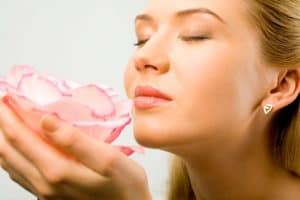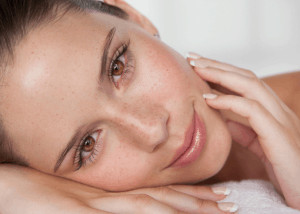Jasmine Essential Oil: Benefits, Uses And Side Effects Explained

I remember visiting my grandmother as a child and playing in her garden often. She did not have a particularly large garden, but she tended to her plants very well. We always said she had ‘green fingers’, and her plants flourished because of it. She used to have a big jasmine plant, and that smell has stayed with me ever since. It is really a beautiful plant, which I later found out had some amazing properties, too.
I remember seeing her talking to plants at a stage and thinking she was going crazy. When I told my mom that I think we need to up her dosage of medication, she laughed. She informed me that it is good to talk to plants – that they react well to positive thoughts and kind words. I thought that was just proverbial ‘mumbo-jumbo’ for a very long time. Until, that is, I finally had a garden of my own.
I decided to do some research into this, and what I found was amazing. Plants that were exposed to 3 hours of classical music a day grew roughly 20% taller than plants that did not have the music. And the biomass of the plants was (on average) 72% greater than that of the plants that had no exposure to the music. Personally, I recommend Brahms, but Shostakovich or Rachmaninov work just as well.
Well, Granny certainly knew what she was doing when it came to growing her jasmine plant. And jasmine definitely knows what it’s doing when it comes to helping us cope with some everyday difficulties! If you want to know more about this wonderful plant and the amazing essential oil it produces, we’ve got you covered. Keep on reading to discover the benefits, uses and side effects of jasmine essential oil.
What Is Jasmine Essential Oil?

There are different methods available for extracting jasmine essential oil.
Jasmine essential oil is extracted from the leaves of the jasmine plant, also known as Jasminum officinale. The plant is native to Eurasia, Australasia, and Oceania. Yet certain species have become naturalized in different areas. For instance, the Spanish jasmine (also known as Jasminum grandiflorum), which was originally from West Asia and India, is now naturalized in the Iberian peninsula. Another type is Jasminum sambac, which is native to tropical Asia and is naturalized in countries such as Madagascar, Cuba and Jamaica.
This plant only blooms at night. Harvesting is very tricky, as it has to be done at night because of this. It is essential that the flowers don’t get bruises during harvesting or transporting in order to allow for the highest quality of oil. Bruising ruins their ability for oil production. So, as you can imagine, producing the oil – Jasmine Absolute – is somewhat of an art form.
To extract the oil from the flower, some use a steam distillation process. However, for this extraction method the temperatures have to be controlled with absolute precision. Otherwise, the leaves will be damaged and they will not produce oil.
Usually, the flowers are placed in a large vat (or container), and a hydrocarbon solvent such as limonene or benzene helps to dissolve the essential oil from the flowers. The mixture is then distilled. What remains is a resin that is a mixture of a wax-like substance andthe essential oil. Pure alcohol is used to extract the essential oil. It absorbs the oil and leaves it behind once it evaporates.
Due to the use of additional solvents and the addition of alcohol, this is not considered to be the best option for extracting the essential oil. But it is still the most commonly utilized method. Because of this, it might be advisable to heat your oil once you get it. This can get rid of additional chemicals or impurities that may remain in the oil.
Although, due to the possibility of allergic reactions, many companies steam-distill the remaining resin. This helps get rid of any remaining impurities.
Benefits Of Jasmine Essential Oil For Hair

Jasmine essential oil can help nourish and revitalize your hair.
Jasmine oil is really helpful for conditioning and re-nourishing hair follicles after extensive sun exposure. You can massage the oil into the scalp to penetrate the follicles from within the center. This will revitalize them, making them stronger and healthier. The natural conditioning properties of the oil work well to keep your hair soft and moist. They leave it free of frizz and add volume to your hair.
By applying jasmine oil to your scalp in a hot oil treatment, you can maximize the effects of the oil and allow it to seep deeper into your scalp. The high antioxidant content in jasmine oil will remove any unwanted toxins from your hair that cause it to become greasy or lead to damage.
Free radicals (which are caused by foods you eat, medication you take or even the air we breathe) generally damage your hair further if left untreated. The best way to treat free radicals is with the use of antioxidants. They trap the free radical molecules and make it possible to expel them from the body. All before the free radicals can start a chain reaction and damage your cells.
I recommend massaging the oil into your hair and working it down your hair until the ends of the strands. Comb your hair out with a normal brush or comb and then wrap your hair with a towel. Allow the oil to settle for a minimum of 20 minutes. After that time has elapsed, wash your hair out with a normal conditioner. (You can add the jasmine oil to your normal shampoo.) Then towel dry your hair.
By massaging and combing the oil into your hair, you stimulate the circulation of blood cells under your scalp. This helps to limit the amount of excess oil your scalp produces, minimizing the oiliness of your hair. The natural moisturizer in jasmine essential oil also reduces the itchiness of an irritable scalp. This is one of the leading causes of dandruff. So with continued use, you can effectively treat both the dandruff flakes in your scalp and also the root cause.
Jasmine Essential Oil For Depression

You can inhale jasmine essential oil or apply it directly to your skin to ease symptoms of depression.
Many people who suffer from depression might gave no idea how to go about treating it. Well, one option is good ole jasmine oil.
Some have called jasmine oil ‘the natural alternative to Valium’ – and it couldn’t be more true. However, unlike Valium, jasmine oil is safe for use at any age. It doesn’t cause any headaches or hangovers, and it is not addictive. Jasmine oil can be used to treat depression and tiredness, and it works well on its own or when blended with lavender essential oil.
To use the oil in order to treat the symptoms of depression, inhale the oil or use it in a steam treatment. However, simply applying the oil to your skin or mixing it with a skin lotion or coconut oil/shea butter (to form a lotion) works well too. By inhaling jasmine oil along with lavender oil, you can also calm your automatic nervous system and induce sleep. By sleeping more, you can revitalize your body and give yourself more energy. Once you have more energy, you’ll start feeling better physically and notice that your mood is starting to improve too.
As you’ve probably noticed, getting enough sleep is really important for balancing your emotions and restoring your hormones. I’d highly recommend trying jasmine oil as a treatment before starting with pharmaceuticals since it has no side effects and a ton of benefits. All at a fraction of the cost of medication.
Benefits Of Jasmine Essential Oil For Skin

Instead of using lotions with chemicals on your skin, try jasmine oil.
Most people search far and wide in order to find the perfect products to help their skin. Well, call off the search squad! Treating your skin with jasmine oil is a much better alternative to using expensive lotions and potions that often leave your skin with a greasy layer. These cosmetics often cause dirt and germs to gather, and they can lead to a blockage of your pores. That spells acne disaster. Yikes!
Jasmine essential oil has a ton of natural antioxidants. So it works well in capturing and removing any free radical compounds that may form on your skin. Free radicals cause chain reactions that erode your skin cells. The antioxidants also work to remove excess skin cells and sebum oil that builds up on the surface of your skin and can lead to blocked pores. This happens to be the number one cause of blemishes and blackheads, so the antioxidants in jasmine oil are true heroes.
Jasmine essential oil has a very low comedogenic rating. This means that it can be applied safely to your skin without the hazard of blocked pores. It is also highly suitable for treating skin conditions such as eczema, as it can moisturize and detoxify the skin. Finally, jasmine oil also works well as a treatment for dry, cracked heels. That’s because it can penetrate deep into the skin layer and generate skin cell production and nourish your epidermis from the inside. Overall, jasmine oil is a great addition to your skincare routine.
Jasmine Essential Oil For Aromatherapy

Using jasmine essential oil in aromatherapy can help you feel calmer and happier.
If you’re a fan of aromatherapy, you’re probably familiar with a whole bunch of essential oils. Jojoba oil, bergamot, ylang ylang, geranium, and clary sage- the list goes on and on. There’s also sandalwood essential oil, patchouli, frankincense, and almond oil, among many other options. Everyone has their favorite oils and scents, and some like to mix it up. But hold on, because jasmine oil might just be the next essential oil you’re putting on your wishlist.
Jasmine essential oil can be your new go-to for aromatherapy and an uplifting feeling. It contains linalool, which has a sedative effect and can reduce anxiety.
The floral scent of jasmine essential oil can be just the thing you need to relax. Breathing in jasmine molecules can actually affect the part of your brain which regulates emotions and helps make you calm. Using a diffuser for aromatherapy can also help a person be in a better mood, sleep better, and ease anxiety. So much power in one little oil!
And all of this can even help jasmine essential oil function as an aphrodisiac. After all, when we’re less stressed and in a better mood, we’re more likely to feel sensual. So jasmine oil might help you get in a good mood – the mood – just as much as massage oils or a nice romantic dinner.
How To Make Your Own DIY Jasmine Essential Oil

You can add in some lavender flowers when making your own jasmine essential oil blend.
Making your own jasmine essential oil blend is actually quite straightforward. I wouldn’t suggest trying to distill your own pure blend, as acquiring the large amount of jasmine flowers you need to create a usable amount can be quite challenging or costly. However, making a blended oil of herbs and flowers is quite easy. Here’s what you’ll need in order to get started:
- 2 cups of jasmine oil.
- 1 cup of lavender flowers.
- ¼ cup of grated vanilla beans.
- ¼ cup of rose petals or a tablespoon of rose essence/water.
- 1 cup of extra virgin olive oil.
- 2 glass jars (with sealable lids).
- 1 metal strainer or muslin cloth filter.
Place the jasmine, lavender, vanilla beans and rose petals or water into a zip-lock bag and crush them gently with the palm of your hand or the base of a bottle of wine. Place the mixture into a glass jar and then add the olive oil.
Seal the jar and let it settle for at least 2 full days. After the time has elapsed, shake the jar well for a few moments. Then filter the oil through the strainer or muslin cloth into the other glass jar. Let the oil set again for an hour before using. Be sure to store it in a cool place, away from direct sunlight too. Then just sit back and enjoy the Jasmine Grandiflorum Absolute.
Side Effects Of Jasmine Essential Oil

First test out the jasmine essential oil on a small section of your skin to make sure that you don’t have any sensitivities to it.
According to the Food and Drug Administration (the FDA), jasmine is generally safe for consumption in food. There’s not too much information out there on how much is safe for you to use when ingesting it or using it on the skin for medicinal purposes.
When it comes to jasmine essential oil, the status is pretty similar. Not a lot of information is available on how much is safe when used on the skin for medicinal purposes either. Some individuals might experience an allergic reaction or other sensitivities such as skin irritation. Therefore, you’re best off testing out the essential oil on a small patch of skin before using it on larger areas of your body just to be safe. You can also blend it with other carrier oils such as lavender essential oil before use in order to dilute it and decrease the chances of skin irritation.
You should definitely check with a doctor before ingesting jasmine essential oil. And as with all essential oils, pregnant women and women who are breastfeeding should check with a health care professional before determining if use of the product is safe for them and their baby.
Conclusion

The many benefits of jasmine essential oil make it definitely worth a try.
Growing jasmine in your garden is always a good idea. I highly recommend it, as the scent is very relaxing and will give your home a lovely sense of calm and peace. You can harvest the flowers to make your own essential oil blend at home. And you can add them to teas or even in your baking for extra flavor or decoration.
The oil of this plant is amazingly beneficial. Just make sure to keep the oil out of the reach of children so that they don’t use it in an unhealthy way. But other than that, jasmine oil is pretty safe to use when done so appropriately. So make sure to up the ‘qty’ before you checkout with your jasmine oil purchase so that you have a decent stock at home.
The benefits of jasmine essential oil are endless. It can soothe your stress, pick you up when you’re down, and heal wounds, scars and even dandruff. You can use it in a DIY recipe to make your own new products, in aromatherapy, or even in perfumery. I’ve come to particularly enjoy a cup of honeyed jasmine tea whilst entertaining friends in the garden – with music for both us and the plants!

